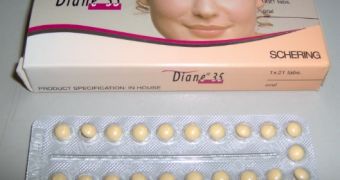This past Wednesday, France's National Agency for the Safety of Drugs and Health Products made it public news that it was to no longer allow pharmacies and other similar drug stores to market a drug known to the general public as Diane 35.
Apparently, this particular drug is first and foremost intended as a treatment against acne.
However, many women use it as an oral contraceptive, simply because its toying with the body's hormonal system does more than just improve on the aspect of one's skin.
More precisely, this particular drug is known to stop ovulation, which is why quite a lot of women in France and all throughout the rest of Europe take it on a fairly regular basis. Pharmabiz informs us that France's decision to suspend the marketing authorization for Diane 35 has to do with the fact that several investigations carried out by the French Medicines Agency have revealed that those taking it can experience clotting disorders at some point in their lives.
Thus, it is being said that as many as four women taking this drug have recently passed away as a result of their developing thromboembolisms.
Furthermore, Pharmabiz says that Diane 35, which happens to be manufactured by German firm Bayer, is only moderately successful in terms of treating acne, and that those suffering with this medical condition have plenty other options to choose from.
Following its deciding that this drug must be suspended within its own borders, France has made it quite clear that it intends to address the European Medicines Agency and ask that all other countries belonging to this continent carry out assessments of the advantages and disadvantages linked to Diane 35.
Once this data is collected, the European Medicines Agency’s Pharmacovigilance Risk Assessment Committee is expected to decide whether or not this drug is to continue being marketed in the EU.
All things considered, it looks like France will finish phasing out Diane 35 in just three months' time.
The country's high officials hope that, by the time this acne treatment is completely removed from pharmacies and similar drug stores nationwide, its users will have managed to find a replacement.

 14 DAY TRIAL //
14 DAY TRIAL //